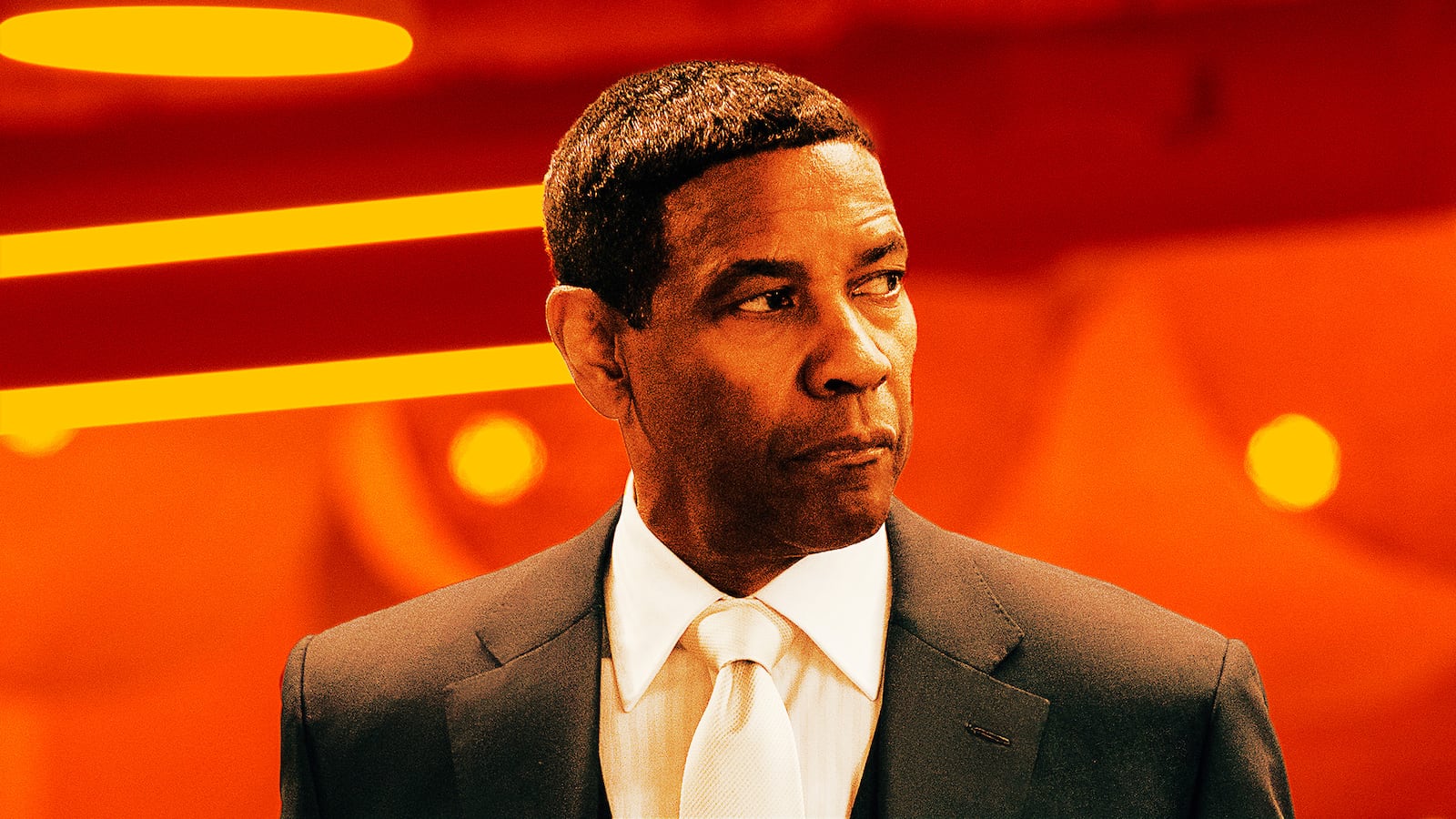Denzel Washington and New York City vie for the spotlight in Highest 2 Lowest, and in the final tally, the two battle to a draw.
Spike Lee’s latest joint—in theaters Aug. 15 on Apple TV+ Sept. 5—is equally awestruck by its leading man and its metropolitan setting, both of which exude such massive, magnetic beauty, power, and charisma that they dwarf everyone and everything else on screen.
They do the heavy lifting with regards to the director’s drama, a remixed version of Akira Kurosawa’s 1963 classic High and Low (itself based on Ed McBain’s 1959 novel King’s Ransom). As a cinematic adaptation and a standalone ransom thriller, the film is something of a mixed bag, in large part because Lee has a pesky habit of (figuratively) interjecting himself into the action. When he prioritizes his other two titanic loves, however, he strikes a rousing nerve.
To the opening sounds of “Oh, What a Beautiful Mornin’,” Highest 2 Lowest gazes dotingly on downtown Manhattan’s skyscrapers and the even lovelier Brooklyn Bridge as they shimmer and sparkle in the bright sunshine. Eventually, Lee’s camera (operated by the great Matthew Libatique) settles on a penthouse balcony where David King (Washington) is negotiating a new deal.
“It’s not a risk, it’s a rebirth,” he states, foreshadowing a forthcoming ordeal that begins with a perilous plan to thwart the sale of his beloved record label—which he founded and made a sensation in the early 2000s, complete with numerous Grammys and Top 10 hits—by purchasing it himself. To do this, David must leverage virtually everything he owns, as well as convince his colleagues (namely, Michael Potts’ loyal but rational Patrick Bethea) to support the move.

David’s wheeling and dealing has allowed him to live up to his surname, but his wife Pam (Ilfenesh Hadera) is less than thrilled with his scheme, since she was looking forward to him ditching the rat race and concentrating on family. Moreover, she worries that David has lost his touch (“the best ears in the business”) because he cares more about the money than the music.
David takes that concern to heart, yet things soon go haywire when he’s notified that his teenage son Trey (Aubrey Joseph) has been kidnapped and the perpetrator is demanding $17.5 million. Panic and terror naturally ensue, as does an appearance by three detectives: Bridges (John Douglas Thompson), Bell (LaChanze), and Higgins (Dean Winters), the last one unsubtly coded as racist. The trio take command of the situation and start suspiciously eyeing David’s loyal driver Paul (Jeffrey Wright), an ex-con and devout Muslim who bristles at being considered a suspect.

As is quickly revealed, Paul has a right to be unhappy about this treatment, since Trey hasn’t been kidnapped; instead, the criminal mistakenly nabbed Paul’s teen son Kyle (Elijah Wright). This begets a new predicament, because while the financially strapped David was going to move mountains to pay for his son’s safe release, he’s far less interested in bankrupting himself to get Kyle back.

This is the moral dilemma at the center of Highest 2 Lowest, and Washington evokes not only David’s confused, conflicted urges, but also the hard, scary cruelty lurking beneath his gregarious exterior. Whether he’s railing at Trey for profanely demanding that he pay the ransom or shadow boxing in his office alone (as he begs for guidance from the ghosts of James Brown, Jimi Hendrix, and Aretha Franklin), Washington is a stew of warring thoughts and feelings, and his bravura larger-than-life turn grows more urgent as his situation deteriorates.
As he dotes on Washington (in their first pairing since 2006’s Inside Man), Lee simultaneously frames his characters so the NYC skyline is a habitual background presence—a formal tack that turns the city into a living, breathing participant in this drama. He additionally makes sure to highlight up-and-down movement (be it via shots of stairs or two centerpieces on the NYC subway), subtly echoing his material’s bedrock push-pull dynamics.

Wealth and poverty, celebrity and anonymity, power and powerlessness, heaven and hell, and virtue and vice are all engaged in fiery combat in Highest 2 Lowest. When it hums, the film conveys the ways in which these forces are fundamental to 21st-century society and, particularly, the Big Apple, where those on top and at the bottom are both separated by vast chasms and constantly crossing paths.
Highest 2 Lowest, alas, regularly gets in its own way—or, rather, Lee himself does, inserting his personal sports fandom into the mix so often that it feels like a parody, which peaks when Nicholas Turturro’s Yankees fan breaks the fourth wall to yell “Boston sucks!” at the screen. Lee also indulges in goofy set decoration (I’m pretty sure Trey wouldn’t have a Kamala Harris “Forward” campaign poster framed on his bedroom wall).
From Howard Drossin’s old-Hollywood orchestral score, to asides about Paul’s Muslim faith, to a chase sequence crosscut with a Puerto Rican Day Parade concert by the late Eddie Palmieri’s Salsa Orchestra, the film frequently turns flavorful flourishes into intrusive distractions. The script is credited to Alan Fox but has the auteur’s fingerprints all over it. Lee’s celebration of his beloved NYC fixations (Yankees advertisements, Brooklyn Dodgers paintings, Jalen Brunson jerseys) come at the expense of momentum and tension. On an individual basis, none of these moments is egregious; in total, however, they radiate directorial narcissism.
(Warning: Some spoilers ahead.)
Lee eschews Kurosawa’s strikingly evocative interior staging and late procedural action in favor of compositions that equate man with his environment and a third act in which David takes matters into his own hands.

As he learns, the culprit behind this mess is an aspiring rapper (A$AP Rocky) whose feelings about David and fame transform the film into a treatise about not simply the haves and have-nots, but the value (and nature) of art in a world governed by commerce and clicks. Frustratingly, Lee wants to have his cake and eat it too when it comes to his villain, whereas—in a change from his source material—he goes all in on his nominal hero. Despite initially miring his saga in moral and ethical uncertainty, he concludes it in surprisingly uncomplicated fashion.
Even so, Highest 2 Lowest confirms that Washington is rarely more alive than when in front of Lee’s lens. Eighteen years after their last collaboration, the two continue to bring out the best in each other—no matter that, in this case, Lee perhaps goes a tad overboard on his end.









